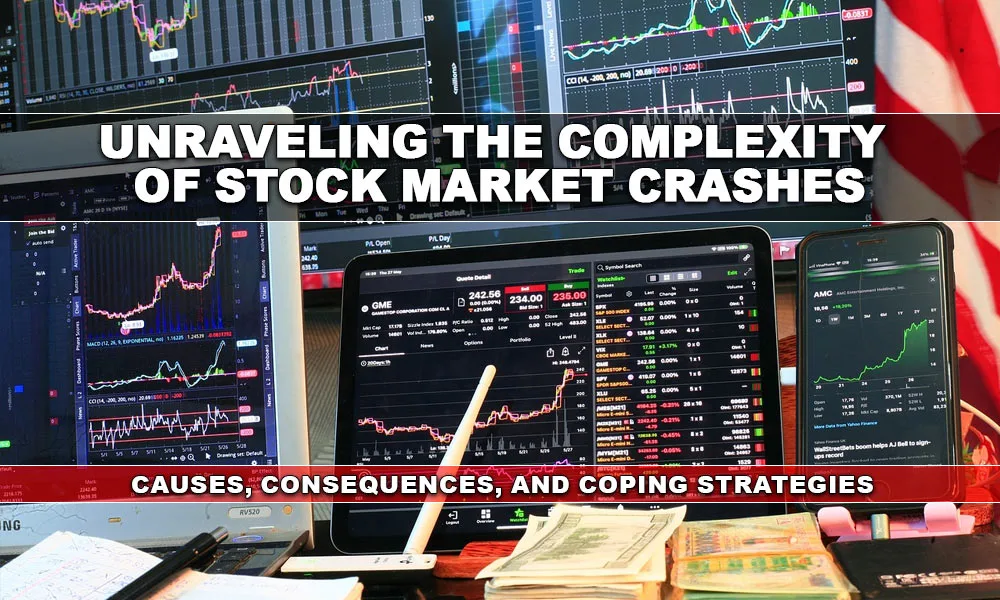Stock market crashes have cast long shadows over financial history, leaving in their wake economic turmoil, investor distress, and calls for regulatory reform. These seismic events punctuate the volatile landscape of financial markets, providing us with critical lessons about the fragility of the global economy and the intricacies of investor psychology.
This article delves into the multifaceted realm of stock market crashes, drawing insights from a comprehensive research paper that examines their causes, consequences, and strategies for mitigation. By dissecting historical market crashes and identifying the underlying factors behind them, we aim to equip readers with a deeper understanding of these catastrophic events.
Table of Contents
Historical Stock Market Crashes
- The Great Depression (1929)
The Great Depression remains one of the most infamous stock market crashes in history. Sparked by the Wall Street Crash of 1929, it resulted in widespread economic devastation, with the U.S. GDP shrinking by approximately 30% from 1929 to 1933. The crash was characterized by a speculative bubble fueled by irrational exuberance and excessive borrowing.
- Black Monday (1987)
Black Monday, occurring on October 19, 1987, saw the Dow Jones Industrial Average plummet by 22.6% in a single day. This crash, often attributed to computerized trading programs and portfolio insurance, showcased the dangers of herd mentality and algorithm-driven trading.
- Dot-Com Bubble Burst (2000)
The Dot-Com Bubble burst in the early 2000s, resulting from the overvaluation of internet-related companies. As investors rushed to capitalize on the internet boom, stock prices soared to unsustainable levels. When the bubble burst, countless tech companies went bankrupt, leaving investors with massive losses.
- Global Financial Crisis (2008)
The Global Financial Crisis of 2008 was a global economic catastrophe triggered by the collapse of Lehman Brothers and the subsequent freezing of credit markets. It was fueled by an array of factors, including subprime mortgage lending, inadequate oversight, and the interconnectedness of financial institutions.
Causes of Stock Market Crashes
- Speculative Bubbles
Stock market crashes often find their roots in speculative bubbles, where investors bid up asset prices well beyond their intrinsic values. This phenomenon is often driven by irrational exuberance, where investors become excessively optimistic about future returns.
- Financial Contagion
The interconnectedness of financial institutions and the global nature of financial markets make them susceptible to contagion. When a crisis strikes one institution or market, it can quickly spread to others, leading to systemic risk.
- Regulatory Failures
Weak oversight and regulatory failures can pave the way for financial crises. Deregulation or lax enforcement can create an environment where risky behavior goes unchecked, increasing the likelihood of a market crash.
- Economic Shocks
External shocks, such as economic recessions, geopolitical events, or natural disasters, can trigger market crashes. These shocks disrupt economic stability and investor confidence, often leading to a panic-driven sell-off.
Consequences of Stock Market Crashes
- Economic Consequences
Stock market crashes can have severe economic repercussions. Reduced consumer and business confidence can lead to decreased spending and investment, resulting in job losses and economic contraction.
- Investor Losses
Investors bear the brunt of market crashes, with portfolios suffering significant losses. This wealth erosion can have long-term implications, especially for retirees who rely on their investments for income.
- Regulatory Responses
In response to market crashes, central banks may intervene by lowering interest rates or implementing stimulus measures. Additionally, regulators may introduce circuit breakers and other mechanisms to prevent further market turmoil.
Mitigation Strategies
- Risk Management
To mitigate the impact of market crashes, investors can employ risk management strategies such as diversifying their portfolios, employing hedging techniques, and adopting a long-term investment approach.
- Regulatory Reforms
Regulators can bolster financial stability by strengthening oversight, enforcing regulations, and implementing counter-cyclical policies. These measures aim to reduce systemic risk and prevent excessive speculation.
- Education and Investor Awareness
Promoting financial literacy and responsible investing practices is crucial. Educated investors are better equipped to navigate market volatility and make informed decisions.
Conclusion
Stock market crashes remain a sobering reminder of the inherent risks in financial markets. By examining the historical crashes and their root causes, we can glean valuable lessons about the importance of prudent investing, robust regulatory oversight, and global economic stability. While we cannot predict when the next market crash will occur, we can strive to be prepared and resilient in the face of uncertainty, ultimately safeguarding our financial well-being and the stability of our economies.
Author
Stay connected for new publications, events, and more.







More Stories
Stocks Talk : January 2025
What’s a charged-off account?
Way to get rich through Stock Market Investing